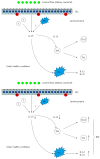Dysregulation of mucosal immune response in pathogenesis of inflammatory bowel disease
- PMID: 24695798
- PMCID: PMC3964397
- DOI: 10.3748/wjg.v20.i12.3255
Dysregulation of mucosal immune response in pathogenesis of inflammatory bowel disease
Abstract
Inflammatory bowel disease (IBD) includes Crohn's disease and ulcerative colitis. The exact etiology and pathology of IBD remain unknown. Available evidence suggests that an abnormal immune response against the microorganisms in the intestine is responsible for the disease in genetically susceptible individuals. Dysregulation of immune response in the intestine plays a critical role in the pathogenesis of IBD, involving a wide range of molecules including cytokines. On the other hand, besides T helper (Th) 1 and Th2 cell immune responses, other subsets of T cells, namely Th17 and regulatory T cells, are likely associated with disease progression. Studying the interactions between various constituents of the innate and adaptive immune systems will certainly open new horizons of the knowledge about the immunologic mechanisms in IBD.
Keywords: Crohn’s disease; Inflammatory bowel disease; Proinflammatory cytokines; T helper 17 cells; T helper cells; Ulcerative colitis.
Figures




References
-
- Baumgart DC, Sandborn WJ. Crohn’s disease. Lancet. 2012;380:1590–1605. - PubMed
-
- Manichanh C, Borruel N, Casellas F, Guarner F. The gut microbiota in IBD. Nat Rev Gastroenterol Hepatol. 2012;9:599–608. - PubMed
-
- Ordás I, Eckmann L, Talamini M, Baumgart DC, Sandborn WJ. Ulcerative colitis. Lancet. 2012;380:1606–1619. - PubMed
-
- Liu Z, Yang L, Cui Y, Wang X, Guo C, Huang Z, Kan Q, Liu Z, Liu Y. Il-21 enhances NK cell activation and cytolytic activity and induces Th17 cell differentiation in inflammatory bowel disease. Inflamm Bowel Dis. 2009;15:1133–1144. - PubMed
Publication types
MeSH terms
Substances
LinkOut - more resources
Full Text Sources
Other Literature Sources
Medical

